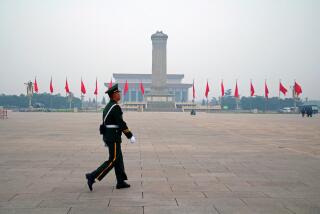China Executes Ex-Official for Corruption
- Share via
BEIJING — Cracking down hard in the highest-level corruption cases in five decades of Communist rule, China announced Thursday that it had executed a former vice chairman of its legislature and arrested a former vice minister of police.
Cheng Kejie of the National People’s Congress standing committee was executed Thursday after being convicted in July of taking $5 million in bribes, according to the official New China News Agency.
Li Jizhou, a former vice minister of public security, was arrested late last year on suspicion of taking huge bribes in the largest alleged smuggling racket to be busted in half a century, the separate China News Service reported. The government and official media had not previously reported his arrest.
Amid tight security and a media blackout, the trials of more than 100 officials implicated in the smuggling case continued for a second day Thursday in Xiamen and four other cities in Fujian province. The case centers on the Yuanhua Group, a conglomerate based in Xiamen that allegedly smuggled billions of dollars worth of cars, oil and raw materials into China with the connivance of local and national officials.
The government reemphasized President Jiang Zemin’s pledge that prosecutors will spare no corrupt official, no matter how high-ranking or well connected.
“There is no place for corrupt elements to hide in the party,” warned an editorial today in the People’s Daily, the flagship newspaper of the Communist Party. “All citizens are equal before the law,” it added.
The China News Service said Li had also been implicated in smuggling rackets involving the municipal government of Zhanjiang and the customs department of the Shenzhen special economic zone, both in Guangdong province.
Li’s arrest was announced at a news conference held by a senior prosecutor, who said that 23,000 other corruption cases have been investigated so far this year. Major cases involving bribery and embezzlement of $120,000 or more increased by nearly 12% compared with the same period last year, the prosecutor said.
Despite the aggressive tone of the official campaign, it remained unclear how far up China’s political hierarchy the prosecutors will go in following the trail of graft. Some observers are waiting to see whether Lin Youfang, a former Xiamen trade official and the wife of Beijing party boss Jia Qinglin, will be investigated in the smuggling case. Jia is considered an ally of President Jiang, and his wife has denied involvement in the case.
Although most Chinese applaud the anti-corruption drive, many also remain cynical about the pervasiveness of graft in their country.
“Which corrupt officials get punished is not fair, it depends on political criteria,” complained author Dai Qing in an interview Thursday. “Whether or not you get executed depends on your attitude toward the central government. This is what we’re most dissatisfied with.”
Beijing has signaled that it does not welcome critics meddling in its anti-graft efforts, and it has tried to silence activists, journalists and intellectuals who have focused attention on the corruption issue.
“Starting in 1998, China’s corruption began a transition from organized corruption to institutionalized corruption,” scholar and journalist He Qinglian wrote in an influential article in the March issue of Book Room magazine, a literary journal popular among intellectuals.
“The fight against corruption,” she noted, “has become a tool to squeeze gains out of others or wage political struggles.”
She was later demoted from her editor’s position at the Shenzhen Legal Daily newspaper, and other media were warned not to publish her writings.
More to Read
Sign up for Essential California
The most important California stories and recommendations in your inbox every morning.
You may occasionally receive promotional content from the Los Angeles Times.













